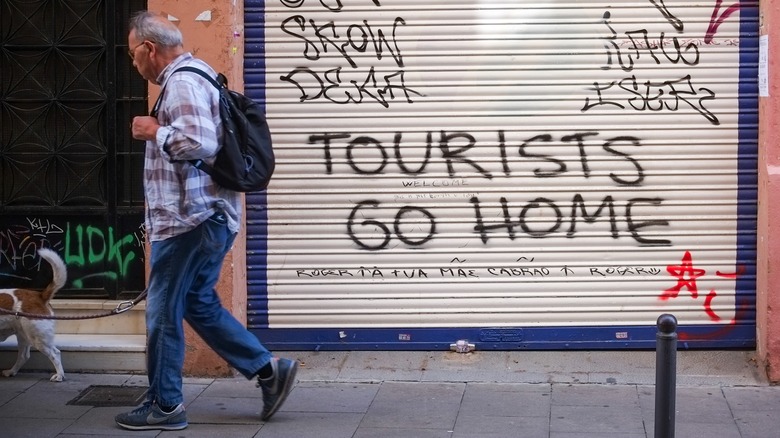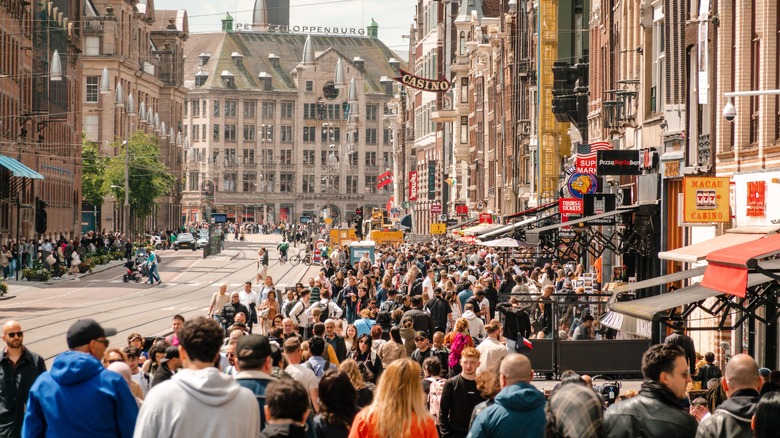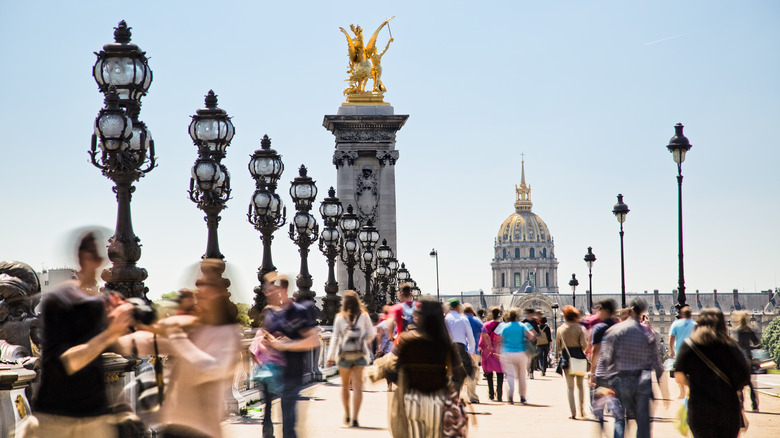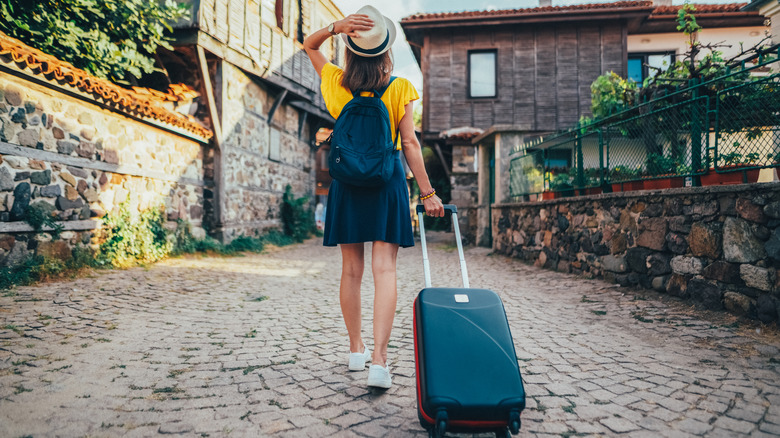European Destinations That Are Banning Or Restricting Airbnbs
Frequent globe trekkers know that not every city or country totally loves tourists. Paris is likely a prime example that comes to mind. After all, former French Foreign Affairs Minister Laurent Fabius once publicly called out Parisians for being less than welcoming to tourists (per ABC News). However, incredibly high numbers of tourists do not just result in slightly irritated locals.
Lots of tourists mean lots of money for countless locations worldwide, but too many tourists can also have adverse effects — from vulnerable coral reef destruction to famous landmarks left damaged or disturbed. This overtourism also causes issues for the daily lives of locals. A glaring issue in Europe is higher rent and a subsequent lack of affordable housing. Short-term vacation rentals, like those found on Airbnb, seem to be at least one driving force behind this. For landlords, tourist rentals are more lucrative than renting to locals for extended amounts of time, leading some property owners to convert their properties into short-term rentals. To better support citizens and avoid overtourism, some European destinations are cracking down on Airbnb, from limits on nights per stay to outright bans.
Politicians in Italy have differing opinions on Airbnb
Florence is one of Italy's most-visited cities, and for good reason. It has been influential for centuries and is home to incredible art, including some of travel expert Rick Steves' absolute favorite artworks to see in Europe. The tourist experience, however, is changing in this beloved destination. The Guardian explained that as the number of Airbnb rentals doubled since 2016, rent rose by an average of 42%. Feeling that the national government was not taking notice, Mayor Dario Nardella (pictured above) took matters into local hands. In October of 2023, Nardella announced that Florence would not allow any new Airbnb listings and would offer tax cuts to short-term rental owners if they instead make their properties available on the city's regular housing market.
Nardella has received both support and opposition for the Airbnb crackdown. Francesco Bechi, the president of the Florence branch of Federalberghi, a hospitality industry trade group, believes that the new rule will help housing costs and also help Florence feel a sense of community again (per Realty Plus). In contrast, Marco Stella of the Forza Italia political party wants to challenge the rule in court.
Locals in Barcelona have protested against tourists
In June of 2024, Barcelona was the focus of international news due to locals squirting tourists with water guns, blocking hotel and restaurant entrances, and displaying signs telling tourists to go home (per Euronews). Increases in housing costs and less overall housing availability has contributed heavily to these anti-tourist actions. According to Sky News, Mayor Jaume Collboni has since vowed to ban all short-term rentals by late 2028 so that such properties can be occupied by locals instead. This is a step further than the city's 2021 decision that required Airbnb owners offering a private room to implement a 31-night minimum, although short-term rentals of whole apartments were allowed (per The New York Times).
For Barcelona, the connection between short-term rentals and expensive housing for locals is not a new one, and neither are the issues with Airbnb. Multiple places in Spain require rental owners to obtain a tourist accommodation provider license, but Airbnb continued to show unregistered properties as available for booking on the company's website. This led Barcelona to start issuing thousands of fines to Airbnb hosts in 2016.
Amsterdam and London have implemented maximum stay laws
Amsterdam is an extremely popular tourism destination thanks to its canals, history, and unique lifestyle differences like recreational marijuana use. The Dutch capital has a slightly different limitation on Airbnb properties, according to Euronews. In Amsterdam, Airbnb hosts can only rent for a collective maximum of 30 nights per year, rather than having a specific minimum number of nights allowed per stay. Therefore, 30 booked nights do not have to be consecutive. If property owners wish to exceed that, they need a short-term rental permit.
London's restrictions are the same as Amsterdam's, but with a maximum of 90 nights per year on Airbnb rentals. Also like the rules in Amsterdam, hosts looking to exceed 90 nights per year need to obtain a permit to get their properties available among regional short-term rentals. The limitation took place in order to keep ample housing for Londoners, which is important given that the city has one of the highest costs of living in the world. Airbnb or other short-term renters will find their properties removed from booking sites when they hit the limit (per GuestReady).
Paris fears Airbnbs will turn the city into an 'open air museum'
In the French capital of Paris, housing for locals is a concern, but there are intangible concerns, too. As previously mentioned, Paris is notorious for having mixed feelings about tourists. The French in general often desire to keep their culture authentically French, adding to their aversion of outside influences — especially regarding the French language. Former mayor of Paris Anne Hidalgo stated in 2019 that too many Airbnbs would turn the capital city into an "open air museum," according to The Local. To further strengthen the requirement that Airbnb hosts must register their properties as short-term rentals, fines are issued for those who continue to make their properties available online without registration.
Three of Germany's major cities have limited short-term rentals, with Berlin outright banning Airbnb in 2016 (per Bloomberg). City officials decided to end the ban in 2018, but still require property owners to get permits if they want to rent out their homes no matter the duration. Just like Paris, fines are issued for renting illegally. Meanwhile, Munich has eight week limits on vacation stays per year, while Stuttgart has 10 week limits unless renters have permits for longer stays.
Ways that travelers can help ease concerns
Visitors looking to help prevent Europe from becoming anti-tourist both in government law and in general public opinion can swap out major destinations with hidden gem alternatives. This helps to avoid overtourism in the big cities and can even help support local economies in smaller towns. And don't worry about these lesser-known places being inconvenient to visit. Europe tends to be well-connected via public transportation between cities large and small.
The obvious way to curb Europe's Airbnb conflict is to stay in hotels or hostels instead. One could argue that hotels are too expensive, but travelers have lamented that Airbnbs are not the affordable alternatives that they once were. Even though in 2023 the company addressed rising costs by allowing hosts to see the prices of other nearby Airbnbs and make their prices more competitive, high demand and even the aforementioned government regulations are still keeping prices higher than when the company first became popular. Prospective Airbnb guests might want to closely compare costs with hotels to make sure that Airbnb is still the most cost-effective lodging option.





